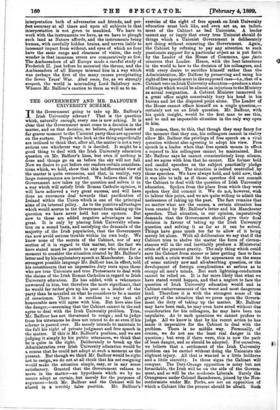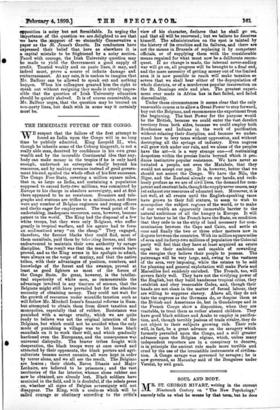THE GOVERNMENT AND MR. BALFOUR'S UNIVERSITY SCHEME.
IS the Government going to take up Mr. Balfour's Irish University scheme ? That is the question which, naturally enough, every one is now asking. It is clear that the Government must come to a decision in the matter, and on that decision, we believe, depend issues of far graver moment to the Unionist party than are apparent on the surtace. People who look at the thing superficially are inclined to think that, after all, the matter is not a very serious one whichever way it is decided. It might be a good thing to deal with the Irish University education question on Mr. Balfour's lines, but even if nothing is done and things go on as before the sky will not fall. Now we desire to put before our readers certain considera- tions which, we hold, show that this indifferentist view of the matter is quite erroneous, and that, in reality, very large consequences are involved. We believe that if the Government now takes up the question and solves it in a way which will satisfy Irish Roman Catholic opinion, it will have achieved a very great success, and will have done an enormous deal towards that pacification of Ireland within the Union which is one of the principal aims of its internal policy. As to the positive advantages which would accrue to the Government from taking up the question we have never held but one opinion. But now to these are added negative advantages no less great. It is only by placing Irish University educa- tion on a. sound basis, and satisfying the demands of the majority of. the Irish population, that the Government can now avoid serious trouble within its own body. We know none of the secrets of the Cabinet, nor of any section of it in regard to this matter, but the fact we have stated must be patent to any one who stops for a moment to consider the situation created by Mr. Balfour's letter and by his explanatory speech at Manchester. In the strongest possible language Mr. Balfour has, in effect, told his constituents that an imperative duty rests upon those who are true Unionists and true Protestants to deal with the claims of the Irish Roman Catholics in regard to Irish University education. He has added, with a vehemence unwonted in him, but therefore the more significant, that he would far rather give up his post as a leader of the party than be muzzled on what he considers to be a matter of conscience. There it is needless to say that all honourable men will agree with him. But here also lies the danger,—assuming that the Cabinet cannot in the end agree to deal with the Irish University problem. True, Mr. Balfour has not threatened to resign ; and to judge from his utterances he does not intend to do so even if his scheme is passed over. He merely intends to maintain to the full his right of private judgment and free speech in the matter. If this is Mr. Balfour's position, and we are judging it simply by his public utterances, we think that he is quite in the right. Deliberately to break up the Administration over Irish University education would be a course that he could not adopt at such a moment as the present. But though we think Mr. Balfour would be right not to resign, we do not at all think that his not resigning would make the situation simple, easy, or in any sense satisfactory. Granted that the Government refuses to move in the matter—an hypothesis which we by no means adopt as certain, but merely for the purposes of argument—both Mr. Balfour and the Cabinet will be placed in a terribly false position. Mr. Balfour's exercise of the right of free speeeh on Irish University education must look like, and even act as, an indict- ment of the Cabinet as bad Unionists. A leader cannot say or imply that every true Unionist should do things which a Unionist Government is deliberately not doing without censuring the Government. Again, the Cabinet by refusing to pay any attention to such passionate support for a particular object as is put forth by the Leader of the House of Commons, ipso facto censures that Leader. Hence, with the best intentions in the world to bow to the decision of his colleagues, and with every desire to sacrifice himself rather than the Administration, Mr. Balfour by preserving and using his rightof free speech must in the supposed case--i.e., that of a Cabinet veto on Irish University education—produce a state of things which would be almost as injurious to the Ministry as actual resignation. A Cabinet Minister immersed in a great office might conceivably bury his head in his bureau and let the disputed point alone. The Leader of the House cannot efface himself on a single question,— certainly not on an Irish question. Mr. Balfour, with his quick insight, would be the first man to see this, and to end an impossible situation in the only way open to him.
It comes, then, to this, that though they may fancy for the moment that they can, his colleagues cannot in reality allow Mr. Balfour the privilege of free speech on a vital question without also agreeing to adopt his view. Free speech in a leader when that free speech means in effect a reproof to his colleagues cannot be maintained. But Mr. Balfour says he cannot conscientiously keep silence, and we agree with him that he cannot. His former bold and candid speeches on the subject practically pledge him to speak out. The situation is indeed controlled by those speeches. We have always held, and hold now, that it was idle to talk as if those speeches did not commit the Cabinet to deal with the question of Irish University education. Spoken from the place from which they were spoken they did commit it. We do not, however, wish to labour this point, and we are quite willing to admit the uselessness of raking up the past. The fact remains that no matter what are the causes, a certain situation has been created by Mr. Balfour's letter and his Manchester speeches. That situation, in our opinion, imperatively demands that the Government should give their final decision in favour of taking up the Irish University question and solving it as far as it can be solved. Things have gone much too far to allow of it being merely let alone. With all deliberation we say that if the Cabinet tries to shelve the matter the force of circum- stances will in the end inevitably produce a, Ministerial crisis of the greatest gravity. The only thing which could save the Cabinet from sooner or later getting face to face with such a crisis would be the appearance on the scene of some entirely new and all-absorbing question, or the development of foreign complications so serious as to occupy all men's minds. But such lightning-conductors cannot be relied on. It is far more likely that what we have stated would happen, and that a neglect to face the question of Irish University education would end in Cabinet embarrassments of the worst and most dangerous kind. Therefore it is with the strongest sense of the gravity of the situation that we press upon the Govern- ment the duty of taking up the matter. Mr. Balfour may have been rash, he may even have acted without due consideration for his colleagues, he may have been too impulsive. As to such questions we cannot profess to judge. All we know is that by his recent action he has made it imperative for the Cabinet to deal with the problem. There is no middle way. Personally, of course, we do not see the least real danger in the question ; but even if there were, this is now the path of least danger, and so should be adopted. For ourselves, we believe that a settlement of the Irish University problem can be carried without doing the Unionists the slightest injury. All that is wanted is a little boldness and a little sincerity. In those signs the Cabinet will conquer. The Tory-Orange opposition is noisy but not formidable, the Irish will be on the side of the Govern- ment, and so will be the moderate Liberals. Surely the Orangemen under Colonel Saunderson, joined by the Non- conformists under Mr. Perks, are not an opposition of which a Cabinet like the present should be afraid. Such opposition is noisy but not formidable. In urging the importance of the question •we are delighted to see that we have the ,support of -so staunchly Conservative a paper as the St. James's Gazette. Its conductors have expressed their belief that here as elsewhere it is a capital mistake to be frightened by a noisy section. Faced with courage, the Irish University question may be made to yield the Government a good supply of credit. Treated weakly and on panic lines, it may, and indeed must, prove a. source of infinite damage and embarrassment. At any rate, it is useless to imagine that Mr. Balfour can be allowed to speak out • and nothing happen. When his colleagues granted him the right to speak out without resigning they made it utterly impos- sible that the question of Irish University education should be quietly shelved. It is of course conceivable, as Mr. Balfour urges, that the question may be treated on nou-party lines, but dealt with in some way it certainly must be.



































 Previous page
Previous page